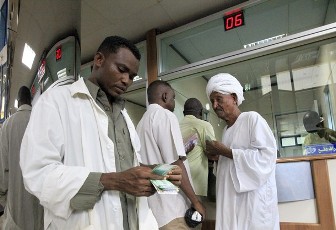Sudan’s economy could contract by 4.5% in 2012: economist
February 26, 2012 (KHARTOUM) – The Sudanese economy could shrink by as much as 4.5% this year given the deteriorating situation after the secession of the oil rich south, an international economist told Agence France Presse (AFP).

The budget deficit is estimated at about $8 billion between 2011 and 2015, said the economist, he also said that he sees the economy contracting by 4.5% this year.
According to a 2011 report by the International Monetary Fund (IMF), oil revenue constituted more than half of the Sudan’s revenue and 90% of its exports.
But with the partition of the country into north and south, the latter took with it 75% of the oil reserves putting Khartoum in a tight spot economically particularly in terms of income and hard currency used to import basic food items.
To makes matters worse, the two countries failed to agree on the fees that landlocked South Sudan should pay to export its oil using the north’s pipelines, which extend all the way to the Red Sea coastal city of Port Sudan.
As the talks dragged on, Khartoum decided late last year to seize part of South Sudan’s oil as a form of payment on what it claimed are outstanding invoices. Juba retaliated by completely shutting down its oil production.
The move, observers feared, pushed the two countries closer to war. All attempts made by regional countries and the African Union (AU) to reverse the decisions taken by Khartoum and Juba on oil have not been successful.
Experts say that even if South Sudan decided to resume production, it would take months for the oil to flow normally for technical reasons.
Until then, the two countries have to look for other sources of income to weather the economic storm arising from the oil shut down.
But for Khartoum the challenge is compounded by the need to support a large bureaucratic machine and multiple security organs viewed as crucial to maintain the government’s grip on power amid multiple insurgencies in different part of the country.
“The situation is deteriorating further and further,” and the economy is in crisis, says University of Khartoum economist Mohamed Eljack Ahmed. “Life has become very difficult.”
“The prices of drugs are now increasing dramatically,” he said.
According to Sudan’s official media outlets, inflation hit 19% last month, and analysts say it could go higher.
Lacking other immediate ways to finance its deficit, economists say the government may resort to printing money, causing more inflation and further weakening the Sudanese pound.
Roughly $38 billion in foreign debt, along with US economic sanctions, limits Sudan’s access to external financing.
The government maintains a fixed exchange rate at about 2.7 pounds for one US dollar but the black market rate has been well above 4.0 since late last year. More recently it has hovered around 5.0.
“Nowadays we are all buying dollars,” in expectation of later profits on the further weakening of the pound, said one money trader working illegally on a downtown street.
“There is a shortage of dollars in the market,” said another dealer, whose clients include importers in need of the cash.
Sudanese authorities imposed tough restrictions on purchasing foreign currency on individuals. It also hampered the ability of corporations to repatriate its profits abroad.
With the government tightly rationing foreign currency, even well-connected businessmen can’t get it through official channels, said the international economist.
Khartoum aims to roughly double its truncated oil production this year while earning $2.5 billion from gold and targeting higher exports of cotton, sugar and other commodities.
But economists say the plan seems unworkable in the short term.
Ahmed says agricultural infrastructure, once the country’s economic mainstay, has collapsed and neither farmers nor industrialists have an incentive to operate.
Under an emergency three-year programme announced in June, Khartoum plans to cut spending and widen the tax base.
However, for political reasons the government cannot broaden the tax base, Ahmed said, because of exemptions given to “certain persons, certain families and organisations”.
(ST)

